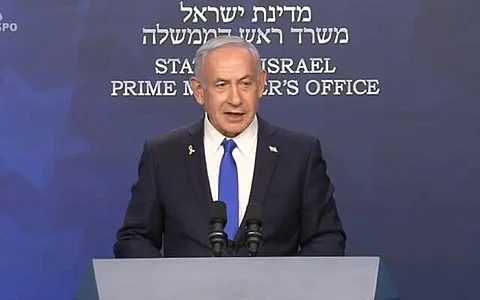

Prime Minister Benjamin Netanyahu on Monday refused to rule out a potential Israeli strike targeting Iran’s supreme leader Ali Khamenei, suggesting such a move would not escalate the conflict but rather “end it.”
In an interview with ABC News, Netanyahu dismissed reports that US President Donald Trump had vetoed an Israeli plan to assassinate Khamenei. “It’s not going to escalate the conflict, it’s going to end the conflict,” he said.
Pressed further, Netanyahu said only: “We’re doing what we need to do.”
He warned that Iran’s nuclear ambitions and ballistic missile programme should worry not just Israel but the United States as well. “Today it’s Tel Aviv, tomorrow it’s New York,” he said. “I understand ‘America First.’ I don’t understand ‘America dead.’”
According to The Times of Israel newspaper, Netanyahu, in a press conference in Israel, detailed the scope of Israel’s ongoing strikes on Iranian territory. Since the offensive began on Friday, he said Israel had killed 10 senior nuclear scientists, destroyed uranium enrichment facilities including Natanz, and obliterated factories used to produce centrifuges and ballistic missiles.
“We are continuing to destroy nuclear targets systematically,” he said. “We struck and continue to strike production factories, one after the next… eliminated Iran’s security leadership, including three chiefs of staff… and neutralised hundreds of ballistic missiles and their launchers.”
Netanyahu also claimed that Israel now controls Iranian airspace. “We’ve simply eliminated the air defence network in western Iran and elsewhere. Half of Iran’s UAVs have been destroyed along with their key radar systems,” he added.
He said the goals of the campaign were threefold: to destroy Iran’s nuclear programme, eliminate its capacity to produce ballistic missiles, and dismantle its regional axis of terror. He acknowledged the Iranian regime could collapse as a result.
National security adviser Tzachi Hanegbi had earlier said a fourth objective was to create conditions for a long-term diplomatic solution that would prevent Iran from reviving its nuclear ambitions.
Netanyahu said Israel was “coordinated with the United States” and speaking regularly with President Trump, who, he claimed, shares the goal of preventing Iran from enriching uranium. “If there’s enrichment capacity, there’s nuclear capacity,” he warned.
He also alleged that Iran had tried to assassinate both him and Trump and was prepared to arm proxies like the Houthi rebels with nuclear weapons.
Asked if Israel could neutralise Iran’s nuclear programme without striking the underground Fordo facility or without more active US support, Netanyahu said Israel was “committed to removing” the threat. “It is an existential danger. We are doing it, and we won’t give up on it.”
Comparing Iran’s nuclear programme to a cancer, he said, “When you have a cancer that threatens to kill you, you cut it out… We are truly carrying out root canal treatment.”
Addressing the strike on Iran’s state broadcasting headquarters earlier that day, Netanyahu defended the move, saying the network was “not a news channel but a propaganda tool of a totalitarian regime.”
The premier also linked the Iran offensive to the stalled hostage negotiations with Hamas, suggesting that weakening Iran could impact the group’s position. “Obviously, if Iran falls — or at least this threat falls — I think it changes the world, but it certainly changes the situation with the proxies in our neighbourhood.”